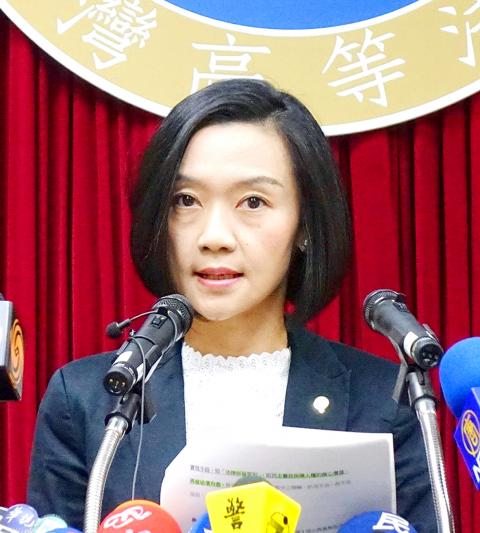The Taiwan High Court yesterday found former president Ma Ying-jeou (馬英九) guilty of leaking classified information obtained from Special Investigation Division (SID) wiretaps of two top lawmakers in 2013.
Ma is the second former Taiwanese president to be convicted of a crime, following former president Chen Shui-bian (陳水扁), since direct presidential elections started in 1996.
Overturning the Taipei District Court’s not guilty verdict delivered on Aug. 25 last year, the High Court said Ma contravened the Communication Security and Surveillance Act (通訊保障及監察法) and the Personal Information Protection Act (個人資料保護法), and was guilty of leaking confidential information under the Criminal Code.

Photo: Fang Pin-chao, Taipei Times
He was sentenced to four months in jail, which can be commuted to a fine of NT$120,000.
Ma said he would appeal the ruling.
An investigation found that Ma had on Aug. 31, 2013, instructed then-prosecutor-general Huang Shih-ming (黃世銘) to hold a meeting regarding transcripts from telephone wiretapping, which were obtained during a judicial investigation into alleged improper lobbying involving Democratic Progressive Party (DPP) caucus whip Ker Chien-ming (柯建銘) and then-legislative speaker Wang Jin-pyng (王金平) of the Chinese Nationalist Party (KMT).
The probe found that Ma then divulged the classified information from the transcripts of a conversation between Ker, Wang and others to then-premier Jiang Yi-huah (江宜樺) and then-Presidential Office deputy secretary-general Lo Chih-chiang (羅智強).
During the trial, Ma claimed “special presidential executive powers,” which he said granted him the right to inquire about ongoing criminal investigations to prepare for potential crises that could destabilize the government.
Ma argued that he had the right to do so based on Article 44 of the Constitution, which states the president has the right to handle a dispute between two or more of the five branches of government.
However, the High Court ruled that the 2013 investigation into Ker and Wang did not involve a dispute between two or more branches of government and Ma was therefore not entitled to exercise the executive power.
Together with the new interpretation, the High Court judges ruled that there was clear evidence that Ma leaked confidential information from the investigation to Jiang and Lo.
“Ma was the nation’s leader at the time, but he had seriously undermined the Constitution and disregarded the rule of law, and clearly is not a model example for people to follow,” the High Court ruling said.
“The Constitution provides guarantees for the basic rights of the people, which the nation’s governmental offices and officials shall not infringe upon,” presiding judge Chiang Chen-yi (江振義) said.
“Ma, as head of the government, should have endeavored to uphold the constitutional framework and the rule of law,” Chiang said.
Huang, who led the now-defunct SID of the Supreme Prosecutors’ Office, was forced to resign from his post in March 2014 and was convicted in 2015 of divulging confidential information to Ma and Jiang.
Revelation of the SID’s wiretapping and secret surveillance of top political figures sparked a firestorm. Ma was accused of pursuing a personal vendetta against Wang and Ker, which led to the “September strife” of 2013, and subsequently to discord and infighting within the KMT.

SECURITY: As China is ‘reshaping’ Hong Kong’s population, Taiwan must raise the eligibility threshold for applications from Hong Kongers, Chiu Chui-cheng said When Hong Kong and Macau citizens apply for residency in Taiwan, it would be under a new category that includes a “national security observation period,” Mainland Affairs Council (MAC) Minister Chiu Chui-cheng (邱垂正) said yesterday. President William Lai (賴清德) on March 13 announced 17 strategies to counter China’s aggression toward Taiwan, including incorporating national security considerations into the review process for residency applications from Hong Kong and Macau citizens. The situation in Hong Kong is constantly changing, Chiu said to media yesterday on the sidelines of the Taipei Technology Run hosted by the Taipei Neihu Technology Park Development Association. With

CARROT AND STICK: While unrelenting in its military threats, China attracted nearly 40,000 Taiwanese to over 400 business events last year Nearly 40,000 Taiwanese last year joined industry events in China, such as conferences and trade fairs, supported by the Chinese government, a study showed yesterday, as Beijing ramps up a charm offensive toward Taipei alongside military pressure. China has long taken a carrot-and-stick approach to Taiwan, threatening it with the prospect of military action while reaching out to those it believes are amenable to Beijing’s point of view. Taiwanese security officials are wary of what they see as Beijing’s influence campaigns to sway public opinion after Taipei and Beijing gradually resumed travel links halted by the COVID-19 pandemic, but the scale of

A US Marine Corps regiment equipped with Naval Strike Missiles (NSM) is set to participate in the upcoming Balikatan 25 exercise in the Luzon Strait, marking the system’s first-ever deployment in the Philippines. US and Philippine officials have separately confirmed that the Navy Marine Expeditionary Ship Interdiction System (NMESIS) — the mobile launch platform for the Naval Strike Missile — would take part in the joint exercise. The missiles are being deployed to “a strategic first island chain chokepoint” in the waters between Taiwan proper and the Philippines, US-based Naval News reported. “The Luzon Strait and Bashi Channel represent a critical access

Pope Francis is be laid to rest on Saturday after lying in state for three days in St Peter’s Basilica, where the faithful are expected to flock to pay their respects to history’s first Latin American pontiff. The cardinals met yesterday in the Vatican’s synod hall to chart the next steps before a conclave begins to choose Francis’ successor, as condolences poured in from around the world. According to current norms, the conclave must begin between May 5 and 10. The cardinals set the funeral for Saturday at 10am in St Peter’s Square, to be celebrated by the dean of the College